Reviews
The New Don Carlos: Historically Accurate, Urgently Relevant
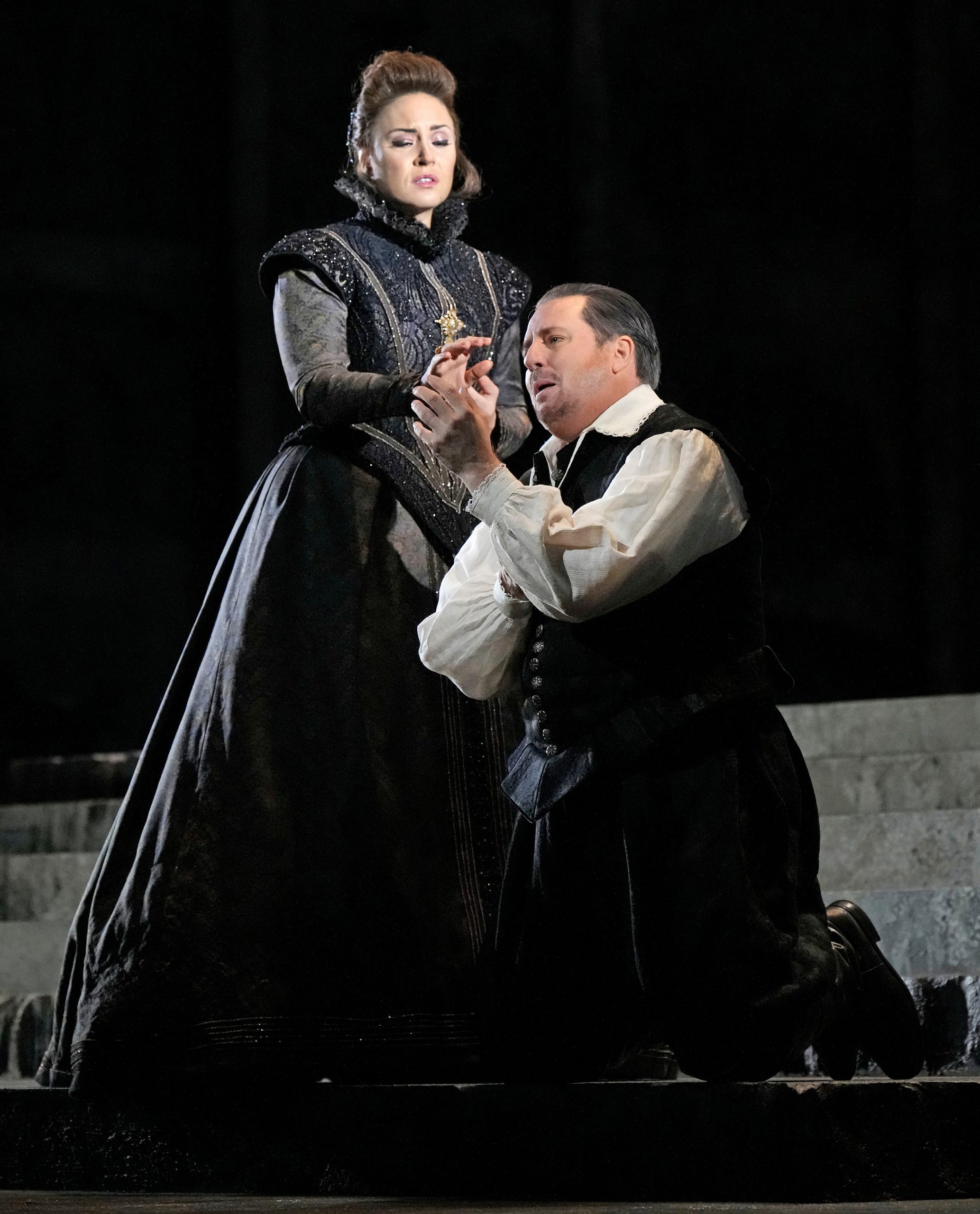 Some opera directors try to lend old works new relevance by staging them in a contemporary setting. David McVicar’s bleakly faithful new production of Verdi’s Don Carlos, which opened at the Metropolitan Opera on Monday, took no such liberties. Even so, Verdi’s monumental portrayal of erotic and political passions at the court of Philip II of Spain took on shocking immediacy. Against the backdrop of Russia’s invasion of Ukraine, the struggle to defend liberty against overwhelming repressive forces felt urgent and real.
Some opera directors try to lend old works new relevance by staging them in a contemporary setting. David McVicar’s bleakly faithful new production of Verdi’s Don Carlos, which opened at the Metropolitan Opera on Monday, took no such liberties. Even so, Verdi’s monumental portrayal of erotic and political passions at the court of Philip II of Spain took on shocking immediacy. Against the backdrop of Russia’s invasion of Ukraine, the struggle to defend liberty against overwhelming repressive forces felt urgent and real.
That connection was brought home even before the show began, when members of the chorus lined up in front of the curtain and delivered a full-throated rendition of the Ukrainian national anthem. Standing among them, his hand on his heart, was Vladyslav Buialskyi, a Ukrainian bass-baritone who was making his house debut as one of the envoys from Flanders.
Flanders, in this opera, is the rebellious province that has been brutally colonized by Spain. And true to the playbook of despots throughout the ages, the Spanish king maintains that what his forces deliver is peace. “Yes,” the reformist Marquis of Posa shoots back when he hears that argument in Act 2 – “the peace of the graveyard!” On Monday, baritone Etienne Dupuis would color those words with bright outrage, while in the pit, egged on by conductor Yannick Nézet-Séguin, the brass responded with rude, rough-edged chords.
The geopolitical mood heightened the drama in a production that was in itself short on ideas. But with a run time of close to five hours, this was not a Don Carlos that should be left to steer itself. Not even with a cast as strong as this.
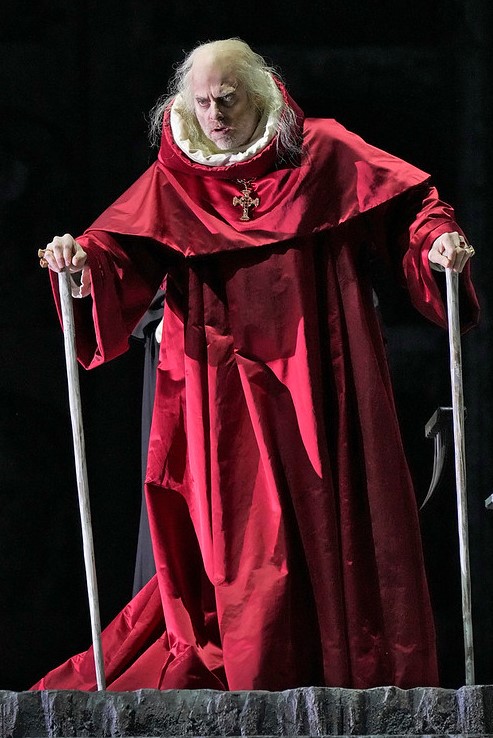 The production was heralded as newsworthy for using the original French text and restoring many of the cuts Verdi made after its indifferently received Paris premiere. This was supposed to be the Don Carlos Verdi intended to write. In fact, the Met’s performance edition remains a hodgepodge of scenes and patches of orchestration drawn from the bewildering number of versions provided by Verdi. That violent outburst in the brass, for instance, which follows Posa’s “graveyard” taunt, was added for one of the opera’s Italian performances.
The production was heralded as newsworthy for using the original French text and restoring many of the cuts Verdi made after its indifferently received Paris premiere. This was supposed to be the Don Carlos Verdi intended to write. In fact, the Met’s performance edition remains a hodgepodge of scenes and patches of orchestration drawn from the bewildering number of versions provided by Verdi. That violent outburst in the brass, for instance, which follows Posa’s “graveyard” taunt, was added for one of the opera’s Italian performances.
Still, the current Met version evokes 19th-century grand opéra in the way it builds up monumental tableaux that highlight the fragility of the individual. At key moments Verdi peels back the layers of sound and spectacle and has a character utter a single, naked, syllable. In the first act the French princess Élisabeth who, having just fallen in love with the Spanish crown prince Carlos, has to give her consent to being betrothed to King Philip instead. The alliance will make peace between their countries as surely as it will break her heart. Her “yes” rings out virtually unaccompanied, highlighting the single word that will set a tragedy in motion. Soprano Sonya Yoncheva movingly rendered it with a tone equal parts young, brave, and detached.
Yoncheva’s Élisabeth maintains much of that detachment throughout the opera, her singing silky, precise, and impenetrable. By contrast Don Carlos, sung in a bravura performance by tenor Matthew Polenzani, simmers and seethes. He was equally convincing in floating lines produced in a translucent mezzavoce, as he was in full cry, a robust warmth and flexibility in even the most declarative moments. His performance conveyed a confidence in his vocal health that was a joy to witness—a tenor almost matter-of-factly easing into the heroic stage of his career.
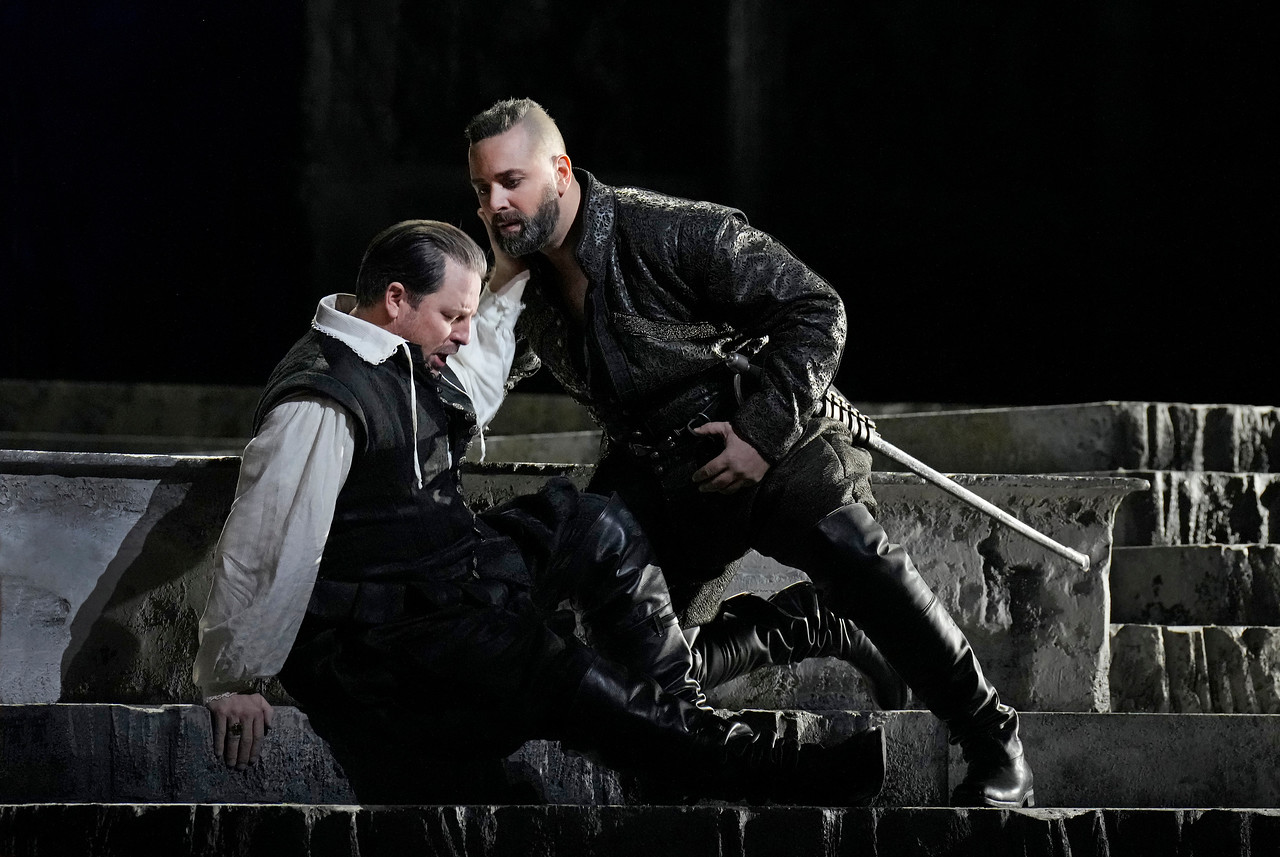
Polenzani found his match in Dupuis, who put in a career-defining performance as Rodrigue, the Marquis of Posa, who guides Carlos’s process of political awakening before sacrificing his life for him. Dupuis, who is French-Canadian, was at home singing in French and delivered lines with theater-worthy clarity and conviction. Lean and elegant, his baritone is nevertheless capable of penetrating massed tutti forces. But when handed one of those exposed monosyllables—after the king warns him not to arouse the wrath of the Grand Inquisitor—his halting “Sire” came across fragile and free of illusions. It was a powerful way to set up the heroism of his subsequent actions.
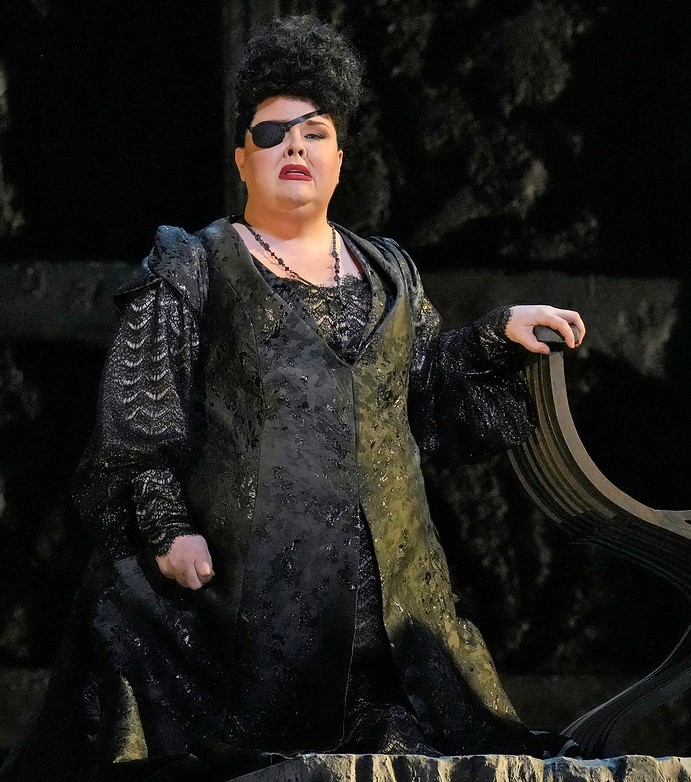 Mezzo-soprano Jamie Barton, somewhat tentative in her first appearance as Eboli, grew in stature over the course of the opera. In her later scenes, fueled by jealousy and remorse, her powerful chest voice and incandescent top notes came into their own. The weak link was bass-baritone Eric Owens, his smooth legato unable to compensate for the colorless timbre of his voice on Monday. He sounded especially underpowered next to the steely resonance of John Relyea’s Inquisitor and the brooding lyricism bass Matthew Rose brought to the role of the oracular monk.
Mezzo-soprano Jamie Barton, somewhat tentative in her first appearance as Eboli, grew in stature over the course of the opera. In her later scenes, fueled by jealousy and remorse, her powerful chest voice and incandescent top notes came into their own. The weak link was bass-baritone Eric Owens, his smooth legato unable to compensate for the colorless timbre of his voice on Monday. He sounded especially underpowered next to the steely resonance of John Relyea’s Inquisitor and the brooding lyricism bass Matthew Rose brought to the role of the oracular monk.
The chorus added rich sound to the crowd scenes, but couldn’t paper over lackluster stage direction, which too often seemed content to herd singers in and out of the spaces between Charles Edwards’s curved catacomb-like sets of black and grey. Respectfully historical costumes by Brigitte Reiffenstuel, too, hewed to a somber palette, with only the blood-red robe of the Inquisitor for contrast. But any tasteful restraint was set aside in the gory auto-da-fé scene, which was animated by the priapic antics of a leering jester and featured the extended death spasms of the condemned as they were garroted on stage. A flash of lurid pomp in a world of enforced sobriety, the scene highlighted how much repressive systems rely on both fear and spectacle.
In its final moments, McVicar’s staging took an unusual turn in order to lend symmetry to this sprawling work. Without giving too much away, it offered a dark kind of closure—the promise of brotherhood in death, if not in victory.
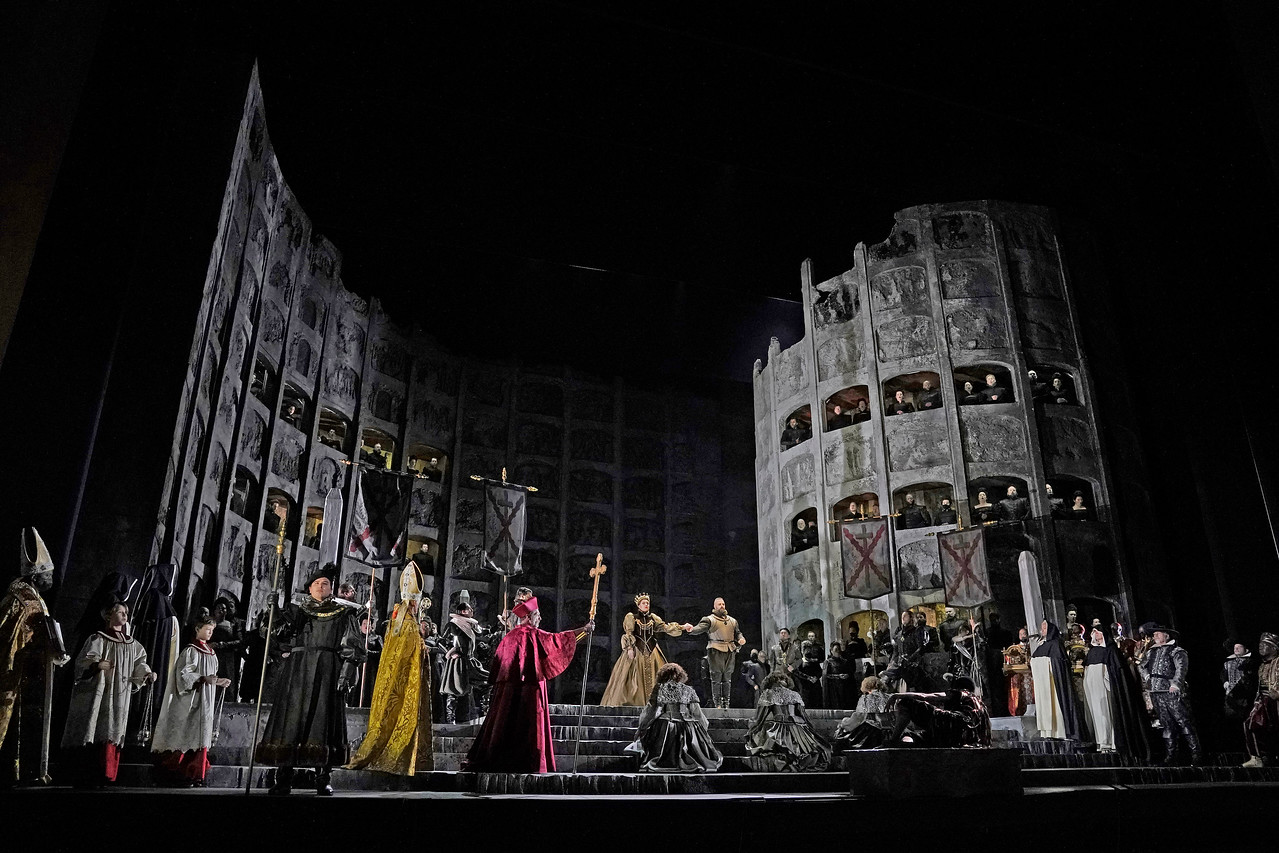
Photos from the top: Sonya Yoncheva and Matthew Polenzani as Élisabeth and Don Carlos; John Relyea as the Grand Inquisitor; Polenzani and Etienne Dupuis as Rodrigue; Jamie Barton as Princess Eboli; stage with chorus.
All photos by Ken Howard.





 FEATURED JOBS
FEATURED JOBS

 RENT A PHOTO
RENT A PHOTO


